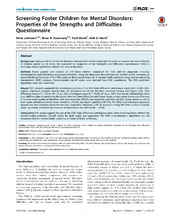Screening Foster Children for Mental Disorders: Properties of the Strengths and Difficulties Questionnaire
Peer reviewed, Journal article
Published version
Permanent lenke
https://hdl.handle.net/1956/9019Utgivelsesdato
2014-07-09Metadata
Vis full innførselSamlinger
Originalversjon
https://doi.org/10.1371/journal.pone.0102134Sammendrag
Background High prevalence of mental disorders among foster children highlight the need to examine the mental health of children placed out of home. We examined the properties of the Strengths and Difficulties Questionnaire (SDQ) in screening school-aged foster children for mental disorders. Methods Foster parents and teachers of 279 foster children completed the SDQ and the diagnostic interview Developmental and Well-Being Assessment (DAWBA). Using the diagnoses derived from the DAWBA as the standard, we examined the performance of the SDQ scales as dimensional measures of mental health problems using receiver operating characteristic (ROC) analyses. Recommended cut-off scores were derived from ROC coordinates. The SDQ predictive algorithms were also examined. Results ROC analyses supported the screening properties of the SDQ Total difficulties and Impact scores (AUC = 0.80–0.83). Logistic regression analyses showed that the prevalence of mental disorders increased linearly with higher SDQ Total difficulties scores (X2 = 121.47, df = 13, p<.001) and Impact scores (X2 = 69.93, df = 6, p<.001). Our results indicated that there is an additive value of combining the scores from the Total difficulties and Impact scales, where scores above cut-off on any of the two scales predicted disorders with high sensitivity (89.1%), but moderate specificity (62.1%). Scores above cut-off on both scales yielded somewhat lower sensitivity (73.4%), but higher specificity (81.1%). The SDQ multi-informant algorithm showed low discriminative ability for the main diagnostic categories, with an exception being the SDQ Conduct subscale, which accurately predicted the absence of behavioural disorders (LHR− = 0.00). Conclusions The results support the use of the SDQ Total difficulties and Impact scales when screening foster children for mental health problems. Cut-off values for both scales are suggested. The SDQ multi-informant algorithms are not recommended for mental health screening of foster children in Norway.

